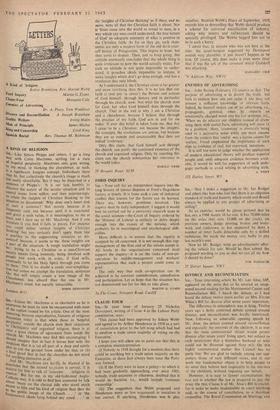CLAUSE FOUR Stn,—In your issue of January 25 Nicholas Davenport,
writing of Clause 4 in the Labour Party constitution, says: 'This clause had been approved by Sidney Webb and agreed to by Arthur Henderson in 1918 as a sort of consolation prize to the left wing which had had to swallow a trade union majority of voting on the Executive.'
I hope you will allow me to point out that this is a complete misinterpretation.
(i) Nobody in 1918 thought for a moment that there could be anything but a trade union majority on the Executive, as there had always been since the Party was formed, (ii) If the Party were to have a policy—to which it had been gradually approaching ever since 1903. nobody, trade unionists or otherwise, doubted that it would be Socialist, i.e., would include 'common ownership.'
(iii) The suggestion that Webb proposed and Henderson more or less acquiesced in socialism is not correct. If anything, Henderson was le plus royaliste. Beatrice Webb's Diary of September, 1919, records him as demanding that Webb should produce a scheme for universal socialisation of industry, asking why miners and railwaymen should be specially privileged. The Webbs begged him not to be in such a hurry.
1 admit that, to anyone who was not here at the time, the quasi-bargain suggested by Davenport sounds very plausible; it just doesn't happen.to be true. Of course, this does make it even more clear that it was the ark of the covenant which Gaitskell was attacking.
MARGARET COLE
'4 Addison Way, NW11


































 Previous page
Previous page